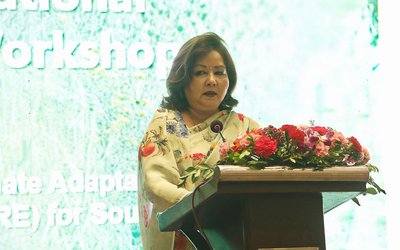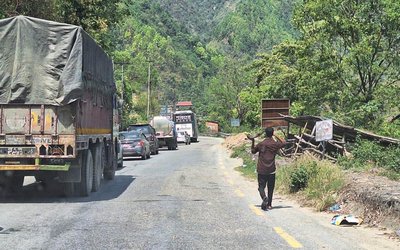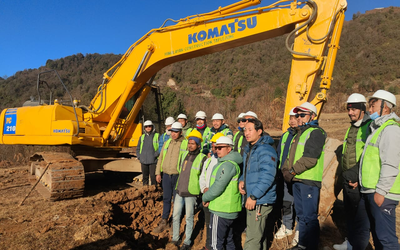
The coronavirus is exacerbating pervasive gender inequalities and discrimination facing women in the region. Gender and social inequalities that underpinned societies in Asia and the Pacific before the novel corona virus disease 2019 (COVID-19) pandemic are now exacerbated, making bad situations for women and girls even worse, warns a new report by UN Women.
In a recent published by OREC, a NGO, highlights pathetic conditions of women due to COViD-19 and shut down. It reported the domestic violence intensified many times within the last one months.
The UN Women report entitled The First 100 Days of the COVID-19 Outbreak in Asia and the Pacific: A Gender Lens, presents a snapshot of the gender dimensions of the socio-economic impacts of the pandemic and captures promising practices for integrating gender in preparedness and response planning while proposing potential and entry points to mitigate the socio-economic impacts for women and girls in the region.
The publication highlights the immediate needs of women in the context of the pandemic, including those of female health-care workers and survivors of gender-based violence, as well as direct impacts related to women and girls’ unpaid care work, sexual and reproductive health and rights, interrupted access to education and unequal access to information.
“Asia and the Pacific continues to be the region most prone to natural disasters in the world.The gendered impacts of additional disasters within the context of COVID-19 can be anticipated: A Mekong drought, for example, combined with the increased need for hygiene practices such as handwashing in the context of the pandemic, will likely result in significant increases to the unpaid care work burden of women, who are primarily responsible for collection of water for household use”says Mohammad Naciri, UN Women Regional Director for Asia and the Pacific.
“Response and recovery efforts must place the needs of women and girls at the centre and be grounded in the socio-economic realities that they face,” he added.
The ‘100 Days’ gender report discusses the impacts and the potential way forward on issues including women, peace and security, gender and disaster risk reduction, ending violence against women and women’s economic empowerment, while stressing the specific needs of marginalized and underserved groups, including refugees, women with disabilities, LGBTQI persons and women living with HIV.
The report also brings to light that a gender lens on this crisis enables us to leverage existing work and expertise – from rebuilding in disasters to rebuilding peace – to ensure that the world post-COVID is built on principles of human rights and gender equality.
As governments around the world issue stay-at-home orders to fight the coronavirus pandemic, a worrying trend has emerged. The UN is calling a rise in domestic violence a “shadow pandemic” and experts say a number of measures need to be implemented immediately.
The coronavirus was affecting financial situation of many and it will increase the violence.
"The stress of losing a job or seeing cuts to income can make some people turn abusive," say expert. "Even if the person has never displayed abusive tendencies before, these can emerge suddenly."
They argue that the economic difficulties of the current situation are exacerbated by the fact that people are being forced to stay at home. Victims often have nowhere to turn.
The reality is especially distressing for women who were ready to leave before the pandemic and now have to stay at home, where they could face further abuse.
"Shadow pandemic”
In a report issued on April 6, a United Nations organization for women's empowerment said the number of women being subjected to violence at the hands of their partners was increasing as couples were forced to spend more time together.
The report says domestic violence has increased by 30% in France since the start of a mandatory stay-at-home order on March 17. Other countries with significant jumps include Singapore and Cyprus, where calls to domestic violence hotlines have risen more than 30%. The report also says demand for women's shelters is growing in Canada, the United States, Germany, Spain and the United Kingdom.
On the other hand, the report says calls to hotlines have fallen in some areas, as women have found it difficult to contact the relevant authorities with their abusive partners always around.
"Some domestic violence centers have stopped in-person consultations because of the coronavirus," expert says. "At the same time, victims can't leave their homes and they can't call for help because their whole family is around. It's an all-around difficult situation."
The UN has urged governments to guarantee shelters and provide online services that women can use via text.
Women organizations working to stop domestic violence are calling on the government to keep consultation centers open. They argue that a system offering flexible options for temporary protection needs to be in place before the centers are closed.
- Path Opened for Cable Car Construction at Pathibhara Pilgrimage Site in Taplejung
- May 15, 2025
- FM Says Sagarmatha Sambaad to facilitate climate change discussions
- May 15, 2025
- Weather Forecast: Partly Cloudy With Brief Rain Is Likely In Pokhara
- May 15, 2025
- Nepal Receives remittances over 1,191 billion in nine months
- May 14, 2025
- 175 Foreign Delegates to Participate in Sagarmatha Dialogue, Special Address by Representatives from China and India
- May 13, 2025
















